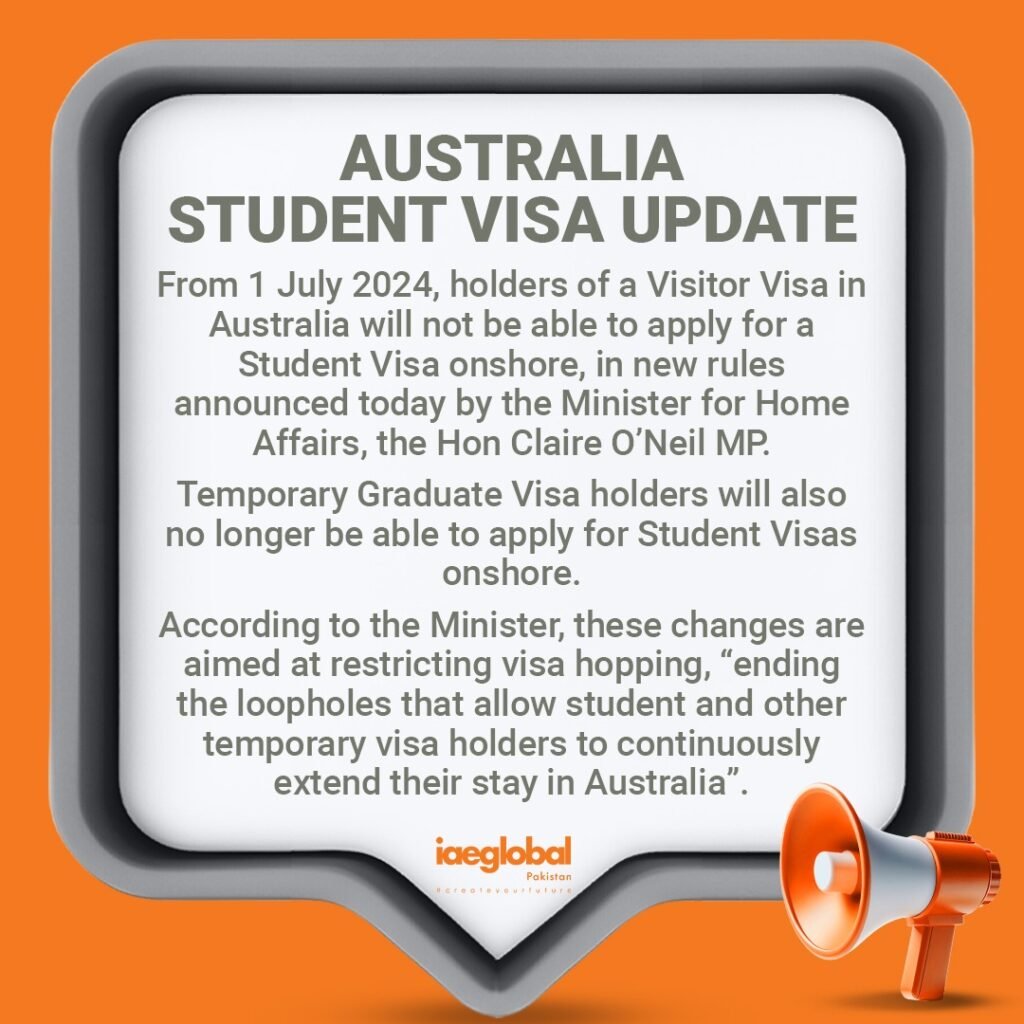News

New Zealand has expanded work rights for the accompanying dependants of foreign students, allowing spouses and partners to work while their family member studies. This policy aims to attract more international students by providing greater support and flexibility for their families. It reflects New Zealand’s commitment to being a welcoming and inclusive destination for education, enhancing the overall experience for international students and their dependants.

Starting July 1st, 2024, Australia will raise the fee for International Student Visas from $710 to $1600. This significant increase aims to cover administrative costs and reflects broader changes in immigration policy. The adjustment may impact prospective students’ financial planning, potentially influencing enrollment decisions and educational opportunities in Australia. As the new fee structure takes effect, stakeholders and applicants are advised to stay informed about further developments and adjustments in visa policies.

The Australian Government prioritizes the integrity of its student visa program, ensuring visas are granted to genuine students who contribute to economic growth. Recently, adjustments to Student visa eligibility were introduced as part of the Migration Strategy launch. Effective July 1, 2024, certain temporary visa holders, including Temporary Graduate, Visitor, and Maritime Crew visa holders, will no longer qualify to apply for student visas while in Australia. These changes aim to streamline visa processes and maintain the program’s integrity.

In 2023, the UK government curtailed dependents’ access to student visas for one-year Masters’ programs. Since January 2024, dependents are prohibited on both student and Graduate routes, aiming to lower graduate visa numbers. This shift already slashed international postgraduate deposits for September 2024 by 63%. The Migration Advisory Committee’s May 14, 2024 findings advocate for preserving the Graduate route, citing no widespread abuse despite reduced student recruitment under the new policy.

Effective March 23, 2024, the Australian Government has replaced the Genuine Temporary Entrant (GTE) requirement for student visas with the Genuine Student (GS) requirement, applicable to new applications. Those lodging before this date must still adhere to GTE standards. The updated approach replaces the 300-word GTE statement with targeted questions, aiming to assess genuine student intentions effectively. This change streamlines the visa process while ensuring applicants’ commitment to study in Australia is appropriately evaluated.

The Home Secretary’s letter to the Migration Advisory Committee (MAC) responds to their Immigration Shortage List (ISL) published on February 23, 2024. It details the government’s acceptance of recommended changes from the review. Additionally, the letter addresses recommendations put forth in MAC’s earlier review of the shortage occupation list on October 3, 2023, also confirming their acceptance. This collaborative approach ensures alignment between policy adjustments and addressing critical skills shortages in the UK.

Beginning March 4, 2024, British Columbia (B.C.) will implement the Provincial Attestation Letter (PAL) system for international students, in line with federal mandates by Immigration, Refugees and Citizenship Canada (IRCC). The PAL will verify student allocations, facilitating streamlined processes under new federal visa application caps. British Columbia is allocating 83,000 undergraduate study permits, with 53% reserved for public institutions and 47% for private institutions, demonstrating its commitment to supporting diverse educational opportunities.

Minister Marc Miller announced initiatives to fortify Canada’s International Student Program, safeguarding against fraud. Effective December 1, 2023, designated learning institutions (DLIs) must verify each applicant’s acceptance letter directly with IRCC, ensuring study permits are issued based on genuine offers. By fall 2024, IRCC will implement a “recognized institution” framework, prioritizing high-standard DLIs. Reforms to the Post-Graduation Work Permit Program will follow, aligning with Canadian labour needs and immigration goals, including Francophone and regional priorities.

IRCC has recently broadened its acceptance of English language tests for SDS applicants, now including CELPIP General, CAEL, PTE Academic, and TOEFL iBT. Additionally, applicants can opt for IELTS General Training or Academic tests. Effective from August 10th onward, revised IELTS requirements for SDS will be implemented. These adjustments are designed to enhance flexibility and accommodate diverse needs among international students seeking Canadian study permits through the Study Direct Stream (SDS).

Starting March 4, 2024, British Columbia (B.C.) is introducing the Provincial Attestation Letter (PAL) system for international students, aligning with federal requirements from Immigration, Refugees and Citizenship Canada (IRCC). The PAL will serve as a verification of student allocations, ensuring a smoother process amidst new federal caps on international visa applications. British Colombia is proud to allocate a total of 83,000 undergraduate study permits, with 53% dedicated to public institutions and 47% to private institutions.

